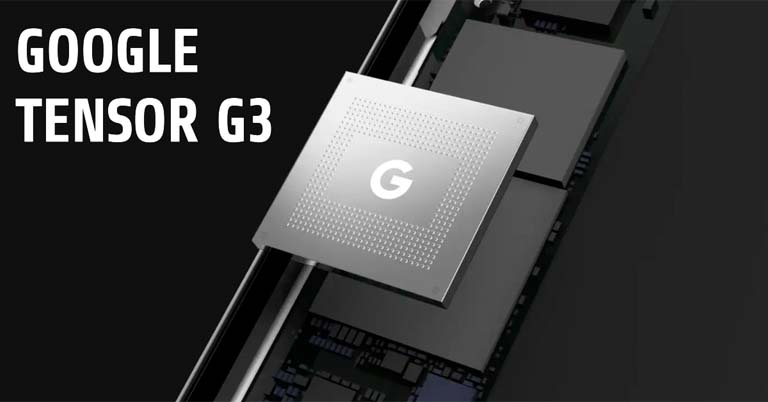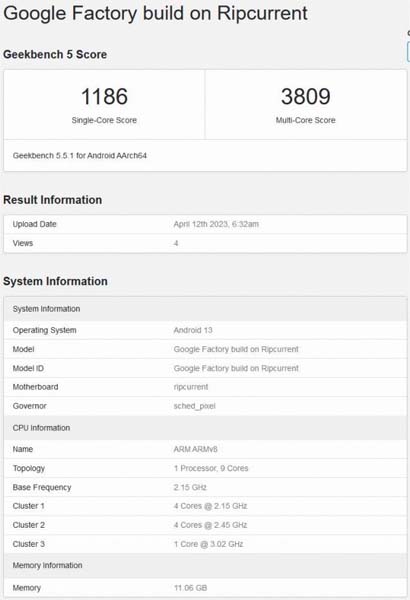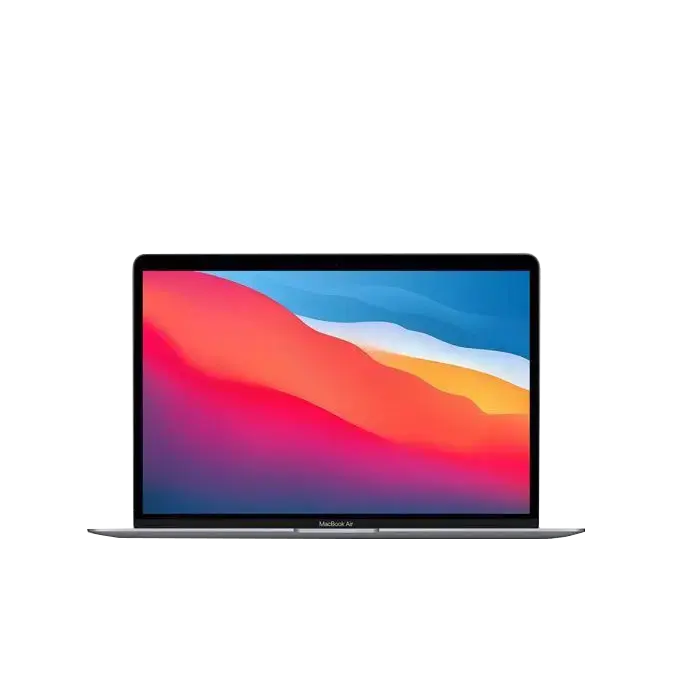
Google’s new Tensor G3 chipset is on the road, which we will be able to see on its upcoming Pixel 8 series. Although the new series is a few months away, we have an idea of what to expect from this upgrade. The chipset will have a 9-core CPU and a 10-core GPU built on Samsung Foundry’s 4nm process. The CPU will provide users with improved performance than the Tensor G2 chip. For this, the new chip will consist of a Cortex-X3 core, four Cortex-A715 cores, and four Cortex-A510 cores.
Google Tensor G3 Rumors Roundup:
The new Tensor G3 will have the GPU of ARM’s latest design, the Immortalis G715. It will basically offer hardware-accelerated ray tracing and 8K video encoding and decoding features. The chip will also support Samsung’s MFC technology for encoding and decoding videos in h.264 and HEVC formats.
Latest ARMv9 Architecture
In the new series of Pixel 8, rumors say that its design will have a unique nine-core layout for the Tensor G3 chipset, with three separate clusters. This design is probably influenced by the merged-core architecture of the A510 series. It allows efficient resource sharing between cores, space optimization, and power consumption.
If we compare it to its previous chip G2, G3 has more up-to-date Cortex-X3, Cortex-A715, and Cortex-A510 cores based on the latest ARMv9 architecture. With the new cores, we can expect a noticeable performance enhancement, lining up with the other flagship SoCs.
With the new ARMv9 architecture, Google can implement new security features, such as Arm’s Memory Tagging Extensions (MTE) to prevent memory bugs. In addition, the new Pixel 8 will also support 64-bit code execution. With this, the users can have a 64-bit-only experience.

- Also read:
New TPU and DSP
Google’s first-generation Tensor chip had the Pixel Neural Core, that featured the “Abrolhos” TPU running at 1.0GHz. It successfully delivered a quite impressive performance in NLP tasks. The Tensor G2 chip was then upgraded to the “Janeiro” TPU at 1.0GHz, offering a performance improvement of up to 60% in camera and speech tasks. Now, the Tensor G3 will feature the “Rio” TPU operating at 1.1GHz, with even greater AI processing power.
Likewise, the chip will also feature Google’s second-gen Digital Signal Processor (DSP), codenamed “Callisto,” with 4 cores and 1065MHz frequency.
Is this the Exynos 2400, too?
Based on the mentioned information, is it possible that Tensor G3 will shed light on Samsung’s Exynos 2400 chip? Well, we will find out after the distribution of the new series. However, the new Exynos will have a similar CPU configuration as G3 with an upgraded XClipse GPU with AMD’s RDNA-2 GPU microarchitecture.
According to rumors, Exynos 2400 will support both 4K 120 fps video encoding and decoding and 8K at 30 fps. Not just that, but it will probably include UFS 4.0 storage support and LPDDR5X RAM with the faster modem.
Overall, we expect the Tensor G3 to offer better performance, improved AI capabilities, and advanced security features in the new Pixel 8 series.
- Meanwhile, check out our review of the Google Pixel 7a.
















![Best Ultrabooks To Buy in Nepal 2024 [Updated] Best Ultrabook Laptops in Nepal 2023 - June Update](https://cdn.gadgetbytenepal.com/wp-content/uploads/2023/04/Best-Ultrabook-Laptops-in-Nepal-2023-June-Update.jpg)
![Best Gaming Laptops in Nepal 2024 [Updated] Best Gaming Laptops in Nepal 2023 - June Update](https://cdn.gadgetbytenepal.com/wp-content/uploads/2023/04/Best-Gaming-Laptops-in-Nepal-2023-June-Update.jpg)


![Best Mobile Phones Under Rs. 15,000 in Nepal [Updated] Best Phones Under 15000 in Nepal 2024 Budget Smartphones Cheap Affordable](https://cdn.gadgetbytenepal.com/wp-content/uploads/2024/03/Best-Phones-Under-15000-in-Nepal-2024.jpg)
![Best Mobile Phones Under Rs. 20,000 in Nepal [Updated] Best Mobile Phones Under NPR 20000 in Nepal 2023 Updated Samsung Xiaomi Redmi POCO Realme Narzo Benco](https://cdn.gadgetbytenepal.com/wp-content/uploads/2024/01/Best-Phones-Under-20000-in-Nepal-2024.jpg)
![Best Mobile Phones Under Rs. 30,000 in Nepal [Updated]](https://cdn.gadgetbytenepal.com/wp-content/uploads/2023/12/Best-Phones-Under-30000-in-Nepal-2024.jpg)
![Best Mobile Phones Under Rs. 40,000 in Nepal [Updated] Best Phones Under 40000 in Nepal 2024 Smartphones Mobile Midrange](https://cdn.gadgetbytenepal.com/wp-content/uploads/2024/02/Best-Phones-Under-40000-in-Nepal-2024.jpg)
![Best Mobile Phones Under Rs. 50,000 in Nepal [Updated] Best Phones Under 50000 in Nepal 2024 Smartphones Midrange](https://cdn.gadgetbytenepal.com/wp-content/uploads/2024/02/Best-Phones-Under-50000-in-Nepal-2024.jpg)
![Best Flagship Smartphones To Buy In Nepal [Updated] Best Smartphones in Nepal 2024 Flagship Premium Samsung Apple iPhone Xiaomi OnePlus Honor](https://cdn.gadgetbytenepal.com/wp-content/uploads/2023/09/Best-Smartphones-in-Nepal-2024.jpg)